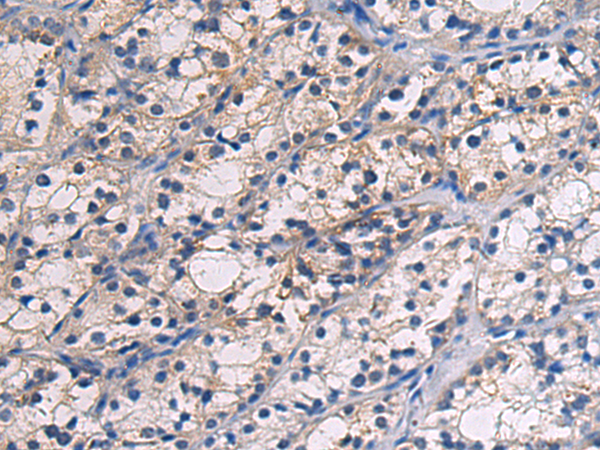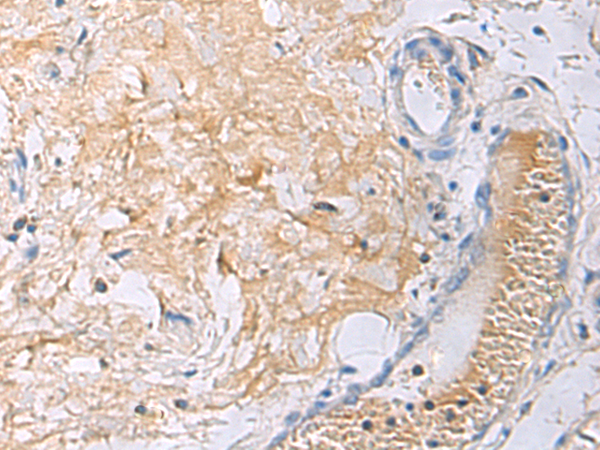

| WB | 咨询技术 | Human,Mouse,Rat |
| IF | 咨询技术 | Human,Mouse,Rat |
| IHC | 1/50-1/100 | Human,Mouse,Rat |
| ICC | 技术咨询 | Human,Mouse,Rat |
| FCM | 咨询技术 | Human,Mouse,Rat |
| Elisa | 1/5000-1/10000 | Human,Mouse,Rat |
| Aliases | hic-1; ZBTB29; ZNF901 |
| Host/Isotype | Rabbit IgG |
| Antibody Type | Primary antibody |
| Storage | Store at 4°C short term. Aliquot and store at -20°C long term. Avoid freeze/thaw cycles. |
| Species Reactivity | Human, Mouse |
| Immunogen | Synthetic peptide of human HIC1 |
| Formulation | Purified antibody in PBS with 0.05% sodium azide and 50% glycerol. |
+ +
以下是3篇关于HIC1抗体的参考文献及其摘要概括:
---
1. **文献名称**:*HIC1 attenuates invasion and metastasis by inhibiting the IL-6/STAT3 signalling pathway in human colorectal cancer*
**作者**:Chen X, et al.
**摘要**:研究利用HIC1抗体通过免疫组化分析结直肠癌组织中HIC1蛋白表达,发现HIC1通过抑制IL-6/STAT3信号通路降低肿瘤侵袭转移能力,其低表达与患者不良预后相关。
2. **文献名称**:*DNA methylation of the HIC1 promoter is associated with obesity-related cardiac dysfunction in mice and humans*
**作者**:Beyer S, et al.
**摘要**:通过Western blot和ChIP实验(使用HIC1抗体),揭示肥胖诱导的HIC1启动子高甲基化导致其蛋白表达下调,进而促进心肌细胞脂质累积和心功能障碍的分子机制。
3. **文献名称**:*HIC1 regulates neuronal apoptosis and neurite development via interaction with Hedgehog signaling*
**作者**:Wang Y, et al.
**摘要**:利用HIC1抗体进行免疫荧光染色,发现HIC1通过调控Hedgehog通路影响神经元凋亡和轴突发育,为神经退行性疾病提供了潜在治疗靶点。
---
以上文献均基于HIC1抗体在蛋白定位、表达分析及分子机制研究中的应用,涵盖癌症、代谢疾病及神经科学领域。如需具体DOI或年份信息可进一步补充。
The HIC1 (Hypermethylated in Cancer 1) antibody is a tool used to detect the HIC1 protein, a zinc-finger transcriptional repressor encoded by the *HIC1* gene. Initially identified as a tumor suppressor, HIC1 is frequently epigenetically silenced in human cancers through promoter hypermethylation, a hallmark of its inactivation. It regulates diverse cellular processes, including cell cycle arrest, apoptosis, and DNA damage response, often in coordination with p53. HIC1 also plays roles in embryonic development, particularly in neural and cardiovascular systems.
HIC1 antibodies are widely employed in cancer research to study its expression patterns, subcellular localization, and interactions. These antibodies enable techniques like Western blotting, immunohistochemistry (IHC), and chromatin immunoprecipitation (ChIP), aiding in the exploration of HIC1's role in tumor suppression and gene regulatory networks. Researchers also use them to investigate HIC1's involvement in chromatin remodeling and transcriptional repression through associations with complexes like Polycomb. Validation of antibody specificity via knockout controls is critical, as cross-reactivity with other zinc-finger proteins may occur. The antibody's utility extends to clinical studies, where loss of HIC1 expression correlates with poor prognosis in various cancers, highlighting its potential as a diagnostic or therapeutic biomarker.
×